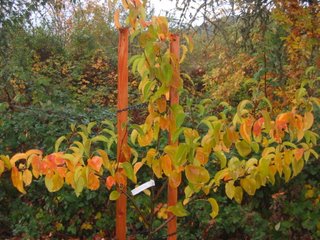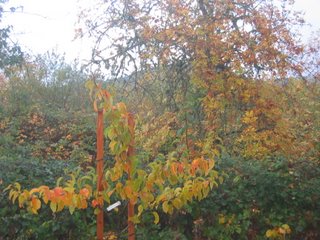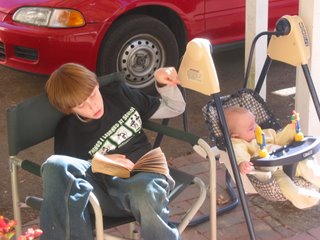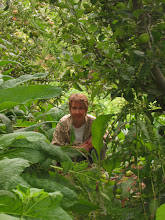Autumn Adventures
Now it's really happening. The leaves aren't falling, they're pouring off the trees! Every day you can see the differences. In our garden the changing colors are so dramatic As we loose the leaves off the trees that form the little forest at the very back of our yard, we also loose our privacy. The temperature's down to 38-40 degrees at night, but much of the time during the day it's still warm enough to be comfortable. So the indoor winter projects will just have to wait.

This is the view (above and below) from our bathroom window. Hard to believe that this is where blackberries were in such abundance only weeks ago, with bees buzzing all over them. The trees now are full of bluejays and different smaller birds. This morning as I watch them I feel like I'm in an aviary. I bet we'll buy a birdfeeder this winter.

I have the quiet and the space to sit and watch the birds now, because our lives have shifted again. Aaron is back in Monterey, but in a way he's still on vacation. His dad has gone to Vermont for 10 days for a meditation retreat, so Aaron in staying with the family of his good buddy Aaron K. So even though he's back in school, the fun continues.

The two weeks he was here went by incredibly fast. For one reason, because he, Maya, Ben and I took a trip to see his Grandma Nan and Aunt Christie on Whidbey Island, in the Puget Sound. It was Ben's first road trip and he was a good sport about spending so much time in the car. From Corvallis to Whidbey was about six hours. We all had a good time, spending time with family and sightseeing. The island is probably the most picturesque place I've seen. Makes Oregon look like we have a tree and water shortage (which we don't). Nan lives outside of the sweet little town of Langley. We took the ferry from Mukilteo (don't they have great names in Washington?) across to Whidbey and then followed the two-lane highway along the water, past little farms and pretty little houses and gardens, to Nan's and Christie's neighborhood. They live in a little piece of heaven. Not only is Nan a grandmother to Aaron, she's also a friend to me and Maya, and the time spent together felt very precious indeed.

As you can see from the photo below, Courtney was quite happy to have us home. I don't know how he slept without his buddy Ben.

As soon as Aaron left for Monterey, Courtney and I drowned our sorrows by attending a slide show about Cuba by Mike,a local peace activist, who's also a staff member of OSU and city councilman. He was part of the Pastors For Peace caravan taking material aid to Cuba in July and this was his report back to his Presbyterian congregation and the community at large.
Much of his slide show focused on the Medical School of the Americas in Havana. Each year they admit 1500 new students from all over the Americas (89 from poor communities in the U.S.). All the students are on full scholarship--their schooling, books, housing and food are all paid. They just have to make a commitment to work in an under-served, disadvantaged community when they finish their schooling. (I know from my time in Guatemala that in some indigenous areas the only doctors they have are either Cuban or Cuban-trained, and I've heard that about other poor regions of Latin America.)
Mike also talked about how Cuba dealt with the collapse of the Soviet Union (approx 1990-1991) and so the end of their access to cheap oil. He compared what Cuba did to what North Korea did. North Korea heavily invested in military buildup (and perhaps nuclear weapons) and the people have suffered periods of mass starvation. Cuba focused its attention on food production and shifted from 80-90% industrial agriculture (petroleum-based, fertilizer/pesticide big ag business) before the collapse to 80-90% organic, locally grown food. The average Cuban lost 20 lbs during the 1990's but there was no starvation. Most Cubans are now in some way involved in their own food production either with their own backyard garden or with neighborhood and community gardens. That to me is so inspiring. And what a good role model for those of us in the U.S. thinking about sustainability issues and our own upcoming end of cheap oil.
Speaking of which, Courtney went to a presentation this week by Ten Rivers Food Web, an organization that is accessing the capability of local farmers to feed the population in the Ten Rivers watershed, encompassing Benton, Linn and Lincoln counties. He was very impressed with the speaker, an activist grower, who favors a return to regional processing of foods and was suggesting how we could head that way in the Willamette Valley.
Meanwhile Courtney and I continue reading more about the Middle East and the history of the conflicts there. And we continue to want to work for peace in the Middle East. And we continue to appreciate our lives together.
Many thanks for reading our blog,
Valori


<< Home